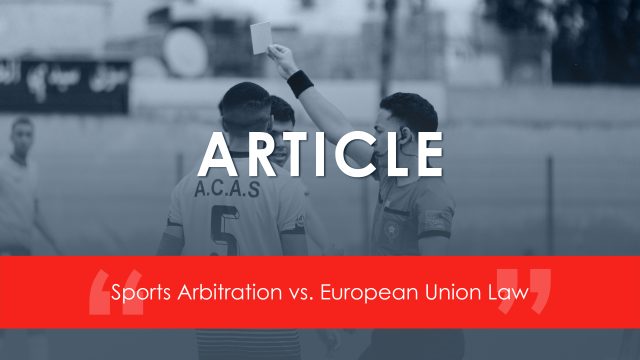
On 1 August 2025, the Court of Justice of the European Union (CJEU) rendered a judgment of significant relevance to the current model of sports arbitration: the decisions of the Court of Arbitration for Sport (“CAS/TAS”), seated in Lausanne, Switzerland, must be subject to effective judicial review by a court of a Member State, where such arbitration is unilaterally imposed by sports federations, such as in the case of FIFA.
Background
The case originated in 2015, when the Belgian club Royal Football Club Seraing (“RFC Seraing”) entered into financing agreements with the company Doyen Sports, under which it transferred part of the economic rights of certain players – a well-known practice prohibited by FIFA known as Third Party Ownership (“TPO”), as governed by Articles 18bis and 18ter of the Regulations on the Status and Transfer of Players (RSTP).
As a result, the club was sanctioned with a registration ban for several transfer windows, in addition to a financial penalty. These sanctions were upheld by the CAS and subsequently by the Swiss Federal Tribunal.
Faced with this outcome, the club appealed to the Belgian judiciary, arguing that there had been no effective judicial control regarding the compatibility of these sanctions with European Union law. The case eventually reached the Belgian Court of Cassation, which submitted preliminary questions to the CJEU, within the scope of Case C-600/23.
The CJEU’s Decision
The CJEU clarified that, where arbitration is unilaterally imposed by sporting bodies (as occurred with FIFA), it is essential that arbitral awards are not exempt from review as to their compliance with the principles and provisions of EU law. Such decisions cannot operate in isolation from the EU legal order.
Accordingly, the Court emphasized that CAS rulings must be subject to potential judicial scrutiny by national courts, particularly in relation to EU competition law and the free movement of persons.
The CJEU further noted that, in cases where an arbitral award is rendered in the context of a dispute relating to the exercise of an economic sporting activity within the EU, and where no direct avenue of appeal exists to a court of a Member State, individuals must be afforded the right to effective judicial review, even if only incidentally, before a national court, as regards the compliance of such award with the fundamental principles and rules of EU public policy.
Implications
This ruling constitutes a substantial limitation on the res judicata authority typically conferred upon arbitral decisions in sports, particularly where such arbitration is imposed without the genuine or voluntary consent of the parties involved.
In any case, the judgment reaffirms the primacy of fundamental rights protected by EU law, namely the right to effective judicial protection and the respect for the foundational principles of EU public order, even in contexts that are formally contractual and appear to be “voluntary” only in form.
This ruling aligns with previous case law trends, notably the Achmea and Komstroy decisions or the International Skating Union v. Commission judgment, or, even in the jurisprudence of the European Court of Human Rights in Mutu and Pechstein, which similarly acknowledged the risks associated with forced arbitration in international sport. In this latest decision, concerns have already been raised about the mandatory and irreversible nature of sports arbitration. The CJEU now deepens this approach by insisting on the necessity of judicial guarantees, particularly where fundamental EU legal principles are at stake.
What Changes?
This CJEU judgment paves the way for clubs, athletes, and other parties involved in complex contractual matters to seek recourse before national courts of the Member States, specifically to: (i) request judicial scrutiny of the compatibility of CAS decisions with EU law; (ii) seek interim relief, such as injunctions or suspension of arbitral decisions; and (iii) claim damages where rights under the EU legal order have been violated.
The decision may trigger a wave of similar claims by clubs or athletes who believe they have been harmed by sports arbitration proceedings, particularly where no avenue for appeal against such awards was available.
Moreover, the ruling now places pressure on organizations such as FIFA and UEFA to revise their internal regulations, which routinely provide for arbitration as the exclusive mechanism for dispute resolution, to the exclusion of national courts.
This landmark ruling, issued on 1 August 2025, marks a turning point in the legal treatment of sports arbitration within the EU legal system: it reaffirms that CAS decisions – even when imposed by regulation – must be open to judicial review by Member State courts whenever they may conflict with the principles and rules of EU law.
Ultimately, the decision strengthens the rule of law in sport, ensuring that the efficiency of arbitration does not override the fundamental rights of clubs, athletes, and other stakeholders.
Finally, the ruling reinforces the principle that, while sports arbitration may offer practical advantages, it cannot supersede the basic guarantees enshrined in EU law, particularly where arbitration is unilaterally imposed.
by Ricardo Cardoso and Carlos Ferreira Vaz, Practice Area – Sports, Fashion and Entertainment



